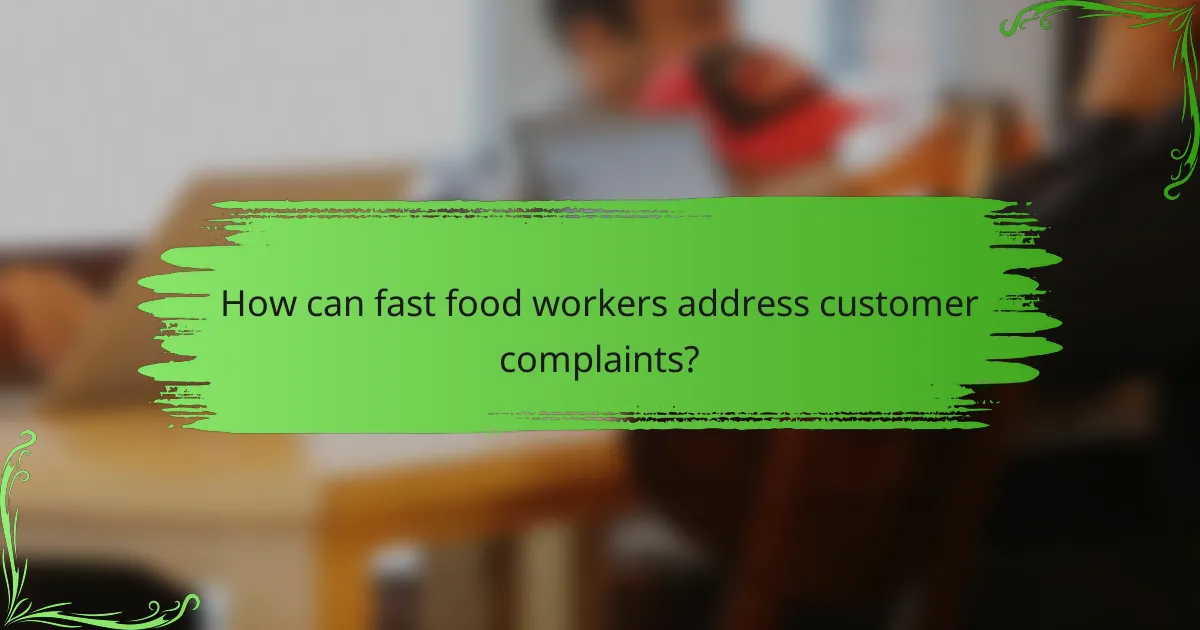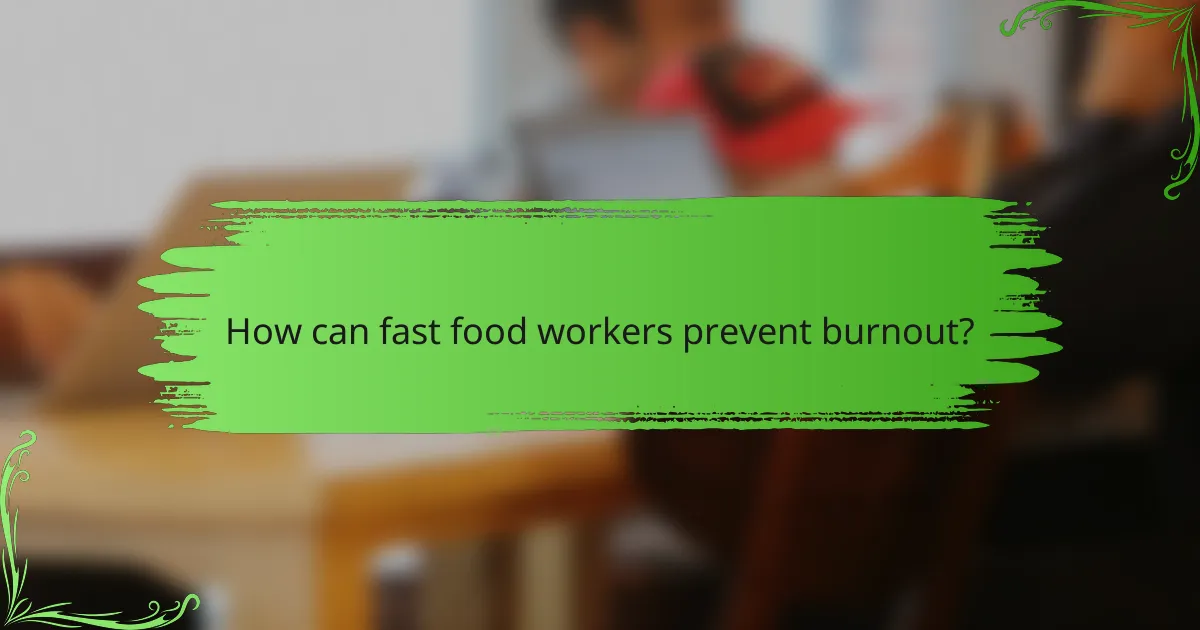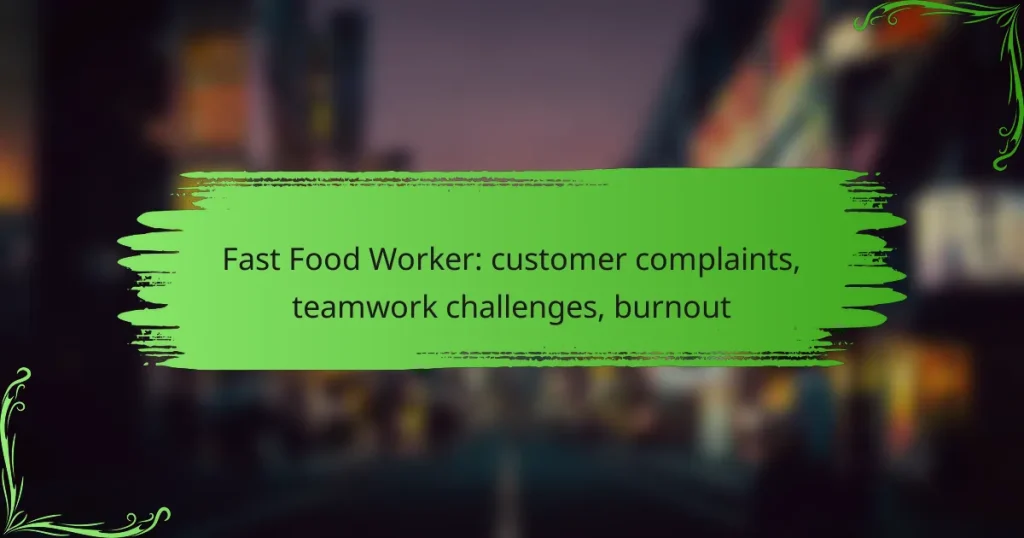Fast food workers face a unique set of challenges, including managing customer complaints, navigating teamwork dynamics, and preventing burnout. Effective communication and training are essential for addressing customer issues and fostering a positive work environment. Additionally, overcoming teamwork challenges and implementing strategies to combat burnout can significantly enhance job satisfaction and service quality.

How can fast food workers address customer complaints?
Fast food workers can effectively address customer complaints by utilizing strong communication skills, engaging in proper training, and implementing feedback systems. These strategies help create a positive environment for both employees and customers, ultimately leading to improved service and satisfaction.
Effective communication strategies
Effective communication is crucial for resolving customer complaints. Fast food workers should actively listen to customers, acknowledging their concerns without interruption. This approach not only shows empathy but also helps in understanding the issue better.
Using clear and concise language when responding to complaints is essential. Workers should avoid jargon and ensure that customers feel heard and valued. A simple acknowledgment of the problem can go a long way in diffusing tension.
Training programs for handling complaints
Training programs focused on complaint handling equip fast food workers with the necessary skills to manage difficult situations. These programs often include role-playing scenarios that simulate real-life complaints, allowing employees to practice their responses.
Regular training refreshers can keep skills sharp and introduce new techniques for dealing with complaints. Establishing a culture of continuous learning helps workers feel more confident and prepared when facing customer issues.
Feedback systems implementation
Implementing feedback systems allows fast food workers to gather insights on customer experiences and complaints. Simple methods, such as comment cards or digital surveys, can provide valuable information on areas needing improvement.
Analyzing feedback regularly helps identify patterns in complaints, enabling management to address recurring issues. Workers should be encouraged to share feedback with their teams to foster a collaborative approach to problem-solving.
Role of management in complaint resolution
Management plays a vital role in the complaint resolution process by providing support and guidance to fast food workers. They should establish clear protocols for handling complaints, ensuring that employees know the steps to take when issues arise.
Additionally, managers should be available to assist workers with complex complaints, offering advice on how to resolve them effectively. A supportive management team can empower employees, leading to better outcomes for both staff and customers.

What teamwork challenges do fast food workers face?
Fast food workers encounter various teamwork challenges that can hinder efficiency and morale. These challenges often stem from communication issues, role ambiguity, and high employee turnover, impacting the overall work environment.
Common sources of conflict
Conflicts in fast food settings typically arise from miscommunication, differing work styles, and stress during peak hours. For instance, a worker may feel overwhelmed if their colleague does not communicate order changes effectively, leading to mistakes and frustration.
Additionally, personality clashes can create tension among team members. When individuals have contrasting approaches to tasks, it can lead to disagreements that disrupt workflow.
Importance of clear roles
Clearly defined roles are crucial for effective teamwork in fast food environments. When each team member understands their responsibilities, it reduces confusion and helps streamline operations. For example, designating specific roles for order taking, cooking, and customer service can enhance efficiency.
Moreover, clarity in roles fosters accountability. When workers know who is responsible for what, it becomes easier to address issues and maintain a cohesive team dynamic.
Team-building exercises
Engaging in team-building exercises can significantly improve cooperation among fast food workers. Activities such as group problem-solving tasks or team outings can help build trust and rapport, making it easier for employees to collaborate during busy shifts.
Simple exercises, like role-playing customer service scenarios, can also enhance communication skills and prepare staff for real-life challenges. Regular team-building initiatives can lead to a more harmonious workplace.
Impact of high turnover on teamwork
High turnover rates in fast food establishments can severely impact teamwork. Frequent staff changes disrupt established relationships and can lead to a lack of cohesion among remaining employees. New hires may require time to acclimate, which can slow down service and increase stress for seasoned workers.
To mitigate these effects, management should focus on retention strategies, such as offering competitive wages and fostering a positive work culture. Reducing turnover can help maintain a stable team, enhancing overall performance and job satisfaction.

How can fast food workers prevent burnout?
Fast food workers can prevent burnout by implementing effective strategies that promote a healthy work-life balance, manage stress, and foster supportive workplace relationships. By taking proactive steps, employees can maintain their energy and enthusiasm for their roles.
Work-life balance strategies
Establishing clear boundaries between work and personal life is crucial for fast food workers. Scheduling regular breaks during shifts and ensuring time off is respected can help maintain this balance. Additionally, workers should prioritize personal time for hobbies and relaxation outside of work hours.
Employers can support this by offering flexible scheduling options, allowing workers to adjust their hours to accommodate personal commitments. This flexibility can significantly reduce stress and improve overall job satisfaction.
Stress management techniques
Fast food workers can benefit from various stress management techniques, such as deep breathing exercises and mindfulness practices. Taking a few moments during breaks to practice these techniques can help reduce anxiety and improve focus on the job.
Physical activity is another effective way to manage stress. Incorporating short walks or stretching exercises during breaks can enhance mood and energy levels, making it easier to handle busy shifts.
Support systems within the workplace
Creating a supportive work environment is essential for preventing burnout. Fast food workers should feel comfortable discussing their challenges with supervisors and colleagues. Open communication can lead to collaborative problem-solving and a stronger team dynamic.
Additionally, establishing peer support groups can provide a platform for workers to share experiences and coping strategies. Regular team-building activities can also strengthen relationships and foster a sense of community, which is vital for overall well-being in high-pressure environments.

What are the best practices for management to support fast food workers?
Effective management practices are crucial for supporting fast food workers, particularly in addressing customer complaints, teamwork challenges, and burnout. Implementing strategies that focus on communication, workplace culture, and mental well-being can significantly enhance employee satisfaction and performance.
Regular check-ins and feedback
Regular check-ins and feedback sessions are essential for understanding the challenges fast food workers face. Managers should schedule brief, consistent meetings to discuss performance, address concerns, and provide constructive feedback. This practice fosters open communication and helps workers feel valued.
Consider using a structured approach, such as weekly one-on-ones or monthly team reviews, to ensure that all employees have the opportunity to voice their thoughts. This can lead to improved morale and a stronger sense of teamwork.
Creating a positive work environment
A positive work environment is vital for fast food workers to thrive. This can be achieved by promoting teamwork, recognizing achievements, and encouraging a supportive atmosphere. Managers should celebrate team successes, whether it’s hitting sales targets or receiving positive customer feedback.
Implementing team-building activities, such as group outings or friendly competitions, can enhance camaraderie among staff. Additionally, ensuring that the workplace is clean, organized, and equipped with necessary tools can further contribute to a positive atmosphere.
Offering mental health resources
Providing mental health resources is crucial for fast food workers who may experience stress and burnout. Management should consider offering access to counseling services, stress management workshops, or mental health days. These resources can help employees cope with the demands of their roles.
Creating a culture that prioritizes mental well-being can lead to lower turnover rates and increased job satisfaction. Managers should also encourage employees to take breaks and utilize their time off to recharge, which can help maintain a healthy work-life balance.

How does the fast food industry impact worker satisfaction?
The fast food industry significantly affects worker satisfaction through factors such as customer complaints, teamwork challenges, and burnout. These elements can create a stressful work environment, leading to low morale and high turnover rates among employees.
Customer complaints
Customer complaints are a common issue in the fast food industry, often stemming from long wait times, incorrect orders, or poor service. Workers frequently face the brunt of these complaints, which can lead to feelings of frustration and helplessness. Addressing complaints effectively requires strong communication skills and a calm demeanor.
To manage customer dissatisfaction, fast food workers should be trained in conflict resolution techniques. Simple strategies include actively listening to the customer, empathizing with their concerns, and offering solutions, such as refunds or replacements. This approach not only helps to resolve the issue but can also enhance the worker’s confidence and satisfaction.
Teamwork challenges
Teamwork challenges in fast food environments often arise from high-pressure situations and diverse team dynamics. Employees must collaborate efficiently during peak hours, which can be difficult if roles are unclear or if there is a lack of communication. Effective teamwork is essential for maintaining service speed and quality.
To foster better teamwork, management should encourage open communication and establish clear roles for each team member. Regular team-building activities can also help strengthen relationships among staff, leading to improved cooperation during busy shifts. Recognizing and rewarding teamwork can further motivate employees to work together effectively.
Burnout
Burnout is a prevalent issue among fast food workers, often resulting from high-stress levels, long hours, and demanding customer interactions. Symptoms of burnout include fatigue, decreased job performance, and a negative attitude towards work. Addressing burnout is crucial for maintaining a healthy workforce.
To combat burnout, fast food establishments should implement measures such as flexible scheduling, adequate breaks, and mental health resources. Encouraging employees to take time off when needed can help prevent exhaustion. Additionally, providing opportunities for career advancement can motivate workers and improve overall job satisfaction.


